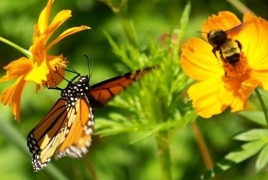Species of wild bees, butterflies pollinating plants face extinction: UN February 26, 2016 - 12:57 AMT PanARMENIAN.Net - Many species of wild bees, butterflies and other critters that pollinate plants are shrinking toward extinction, and the world needs to do something about it before our food supply suffers, a new United Nations scientific mega-report warns, according to the Associated Press. The 20,000 or so species of pollinators are key to hundreds of billions of dollars' worth of crops each year — from fruits and vegetables to coffee and chocolate. Yet 2 out of 5 species of invertebrate pollinators, such as bees and butterflies, are on the path toward extinction, said the first-of-its-kind report. Pollinators with backbones, such as hummingbirds and bats, are only slightly better off, with 1 in 6 species facing extinction. "We are in a period of decline and there are going to be increasing consequences," said report lead author Simon Potts, director of the Centre for Agri-Environmental Research at the University of Reading in England. The report is the result of more than two years of work by scientists across the globe who got together under several different UN agencies to come up with an assessment of Earth's biodiversity, starting with the pollinators. It's an effort similar to what the United Nations has done with global warming, putting together an encyclopedic report to tell world leaders what's happening and give them options for what can be done. The report, which draws from many scientific studies but no new research, was approved by a congress of 124 nations meeting in Kuala Lumpur on Friday, Feb 26. "The variety and multiplicity of threats to pollinators and pollination generate risks to people and livelihoods," the report stated. "These risks are largely driven by changes in land cover and agricultural management systems, including pesticide use." But these are problems that can be fixed, and unlike global warming, the solutions don't require countries to agree on global action — they can act locally, said Robert Watson, a top British ecological scientist and vice chairman of the scientific panel. The solutions offered mostly involve changing the way land and farming is managed. "There are relatively simple, relatively inexpensive mechanisms for turning the trend around for native pollinators," said David Inouye of the University of Maryland, a co-author of a couple chapters in the report. Photo: Pachamama The number of state universities will be reduced from 23 to 8 by 2030, Minister of Education, Science, Culture and Sport Zhanna Andreasyan has said. From September 21 to November 11, a total of 2,820 Russians registered at a place of residence in Armenia, the police has said. The situation on the contact line between Karabakh and Azerbaijan was relatively stable overnight, the Defense Army says. Defense Minister Suren Papikyan has visited the southern Armenian province of Syunik, the Defense Ministry reported on March 18. Partner news |